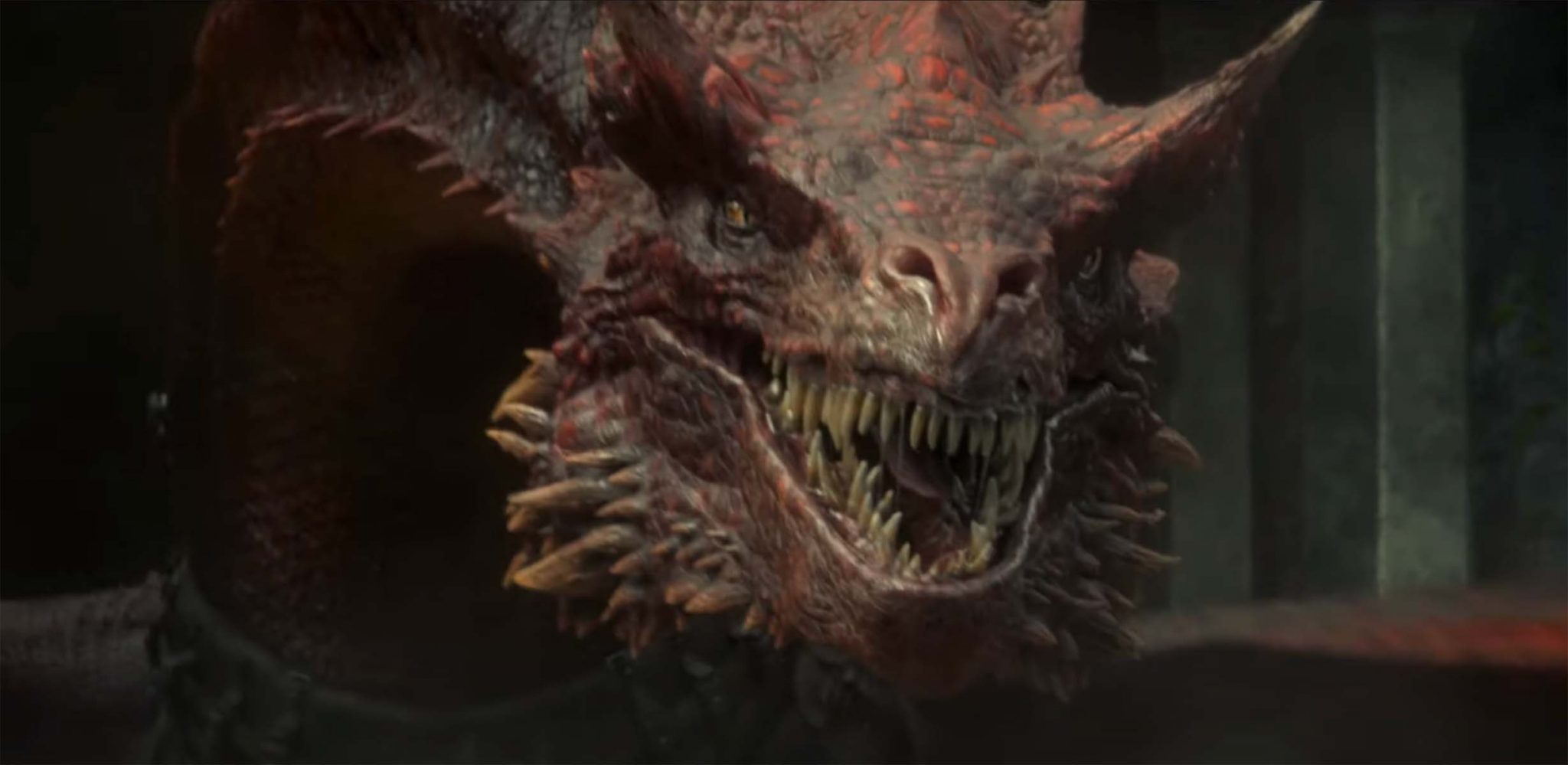We are watching these TV shows with bated breath waiting for everyone to die (if they’re lucky) or survive in failure and shame (if they’re not)
Genre criticism still often begins from the flattened notion that fantasy is about ‘the past’ while science fiction is about ‘the future’; if you want to get more specific, the typical knock against fantasy is that fantasy registers a toxic nostalgia for aristocracy, white supremacy, and patriarchy, while the speculations of science fiction (or at least the very best of science fiction) offer utopian glimpses of the many alternate world-systems we might collectively build instead. At moments in culture where science fiction is ascendent, we might extrapolate that a society is forward-looking and progressive, even when it knows it needs to confront very serious challenges; at moments where fantasy reigns supreme, we might instead imagine that a society is backwards-looking, regressive, even infantile in its desire to go back to the ‘good old days’ rather than confront the miseries of its present or dream up the possibility of some better future. In the US and UK, fantasy has reigned supreme a long time, especially for those who would see Star Wars (1977-) as a story about good space wizards fighting evil space wizards and who recognize the Marvel Cinematic Universe as, in the final analysis, a narrative about a wicked demon who is seeking to collect a set of magic gems. And, if we had any doubt, the nearly simultaneous releases of the Game of Thrones prequel House of the Dragon (2022) on HBO and the Lord of the Rings prequel The Rings of Power (2022) on Amazon Prime this month, which both drew huge viewing figures, should put all doubt to rest about which genre is triumphant in 2022.
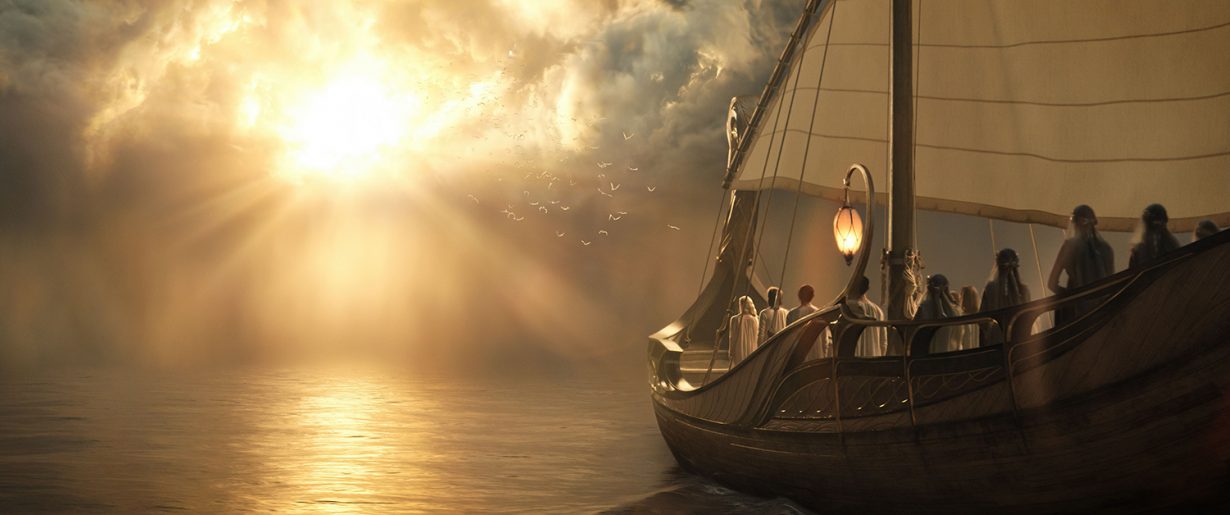
The two projects are, in some ways, surprisingly similar. Both have been approached through the notion that these are ‘woke’ revisions of their source texts, centred on female protagonists and using an ostensibly raceblind casting philosophy to make their fantasy kingdoms better reflect not only contemporary diversity but also the real diversity of the medieval period, which was never as monochromatically white as either the heroic fantasy genre or the typical history curriculum have had it (and which, of course, was a time where the modern conception of race did not exist in the first place). Both have, in turn, been spitefully review-bombed by racist and sexist cranks who refuse to accept these creative decisions, with many such negative one-star reviews appearing before any episode of the show had even aired. And both are prequels, with deeply uneasy relationships to their originals: House of the Dragon lives in the shadow of the highly disappointing final seasons of Game of Thrones (2011-2019), including a finale once famously said to be so bad it permanently removed Westeros from the cultural conversation overnight, while The Rings of Power follows up on a text so beloved that many of its most devoted fans didn’t want the show to be made at all, lest it tarnish either the original Lord of the Rings books (1954) or the nearly equally acclaimed Peter Jackson trilogy (2001-2003) by association. House of the Dragon has promoted itself as a feminist response to the anti-feminist ending of Game of Thrones, a deliberate attempt to redo the story of Daenerys Targaryen right this time – while anticipation for The Rings of Power frequently stoked the fears of the Middle-earth purists, given the show’s focus on the palace intrigue and moral corruption of the Second Age (even introducing sex into what has been, till now, an almost entirely sexless Middle-earth). The fact the show famously began with Jeff Bezos’s desire for his own Game of Thrones has shaped discourse around the show ever since, including reports last February that an intimacy coordinator had been hired for nudity on set that Amazon had to walk back after fan backlash.
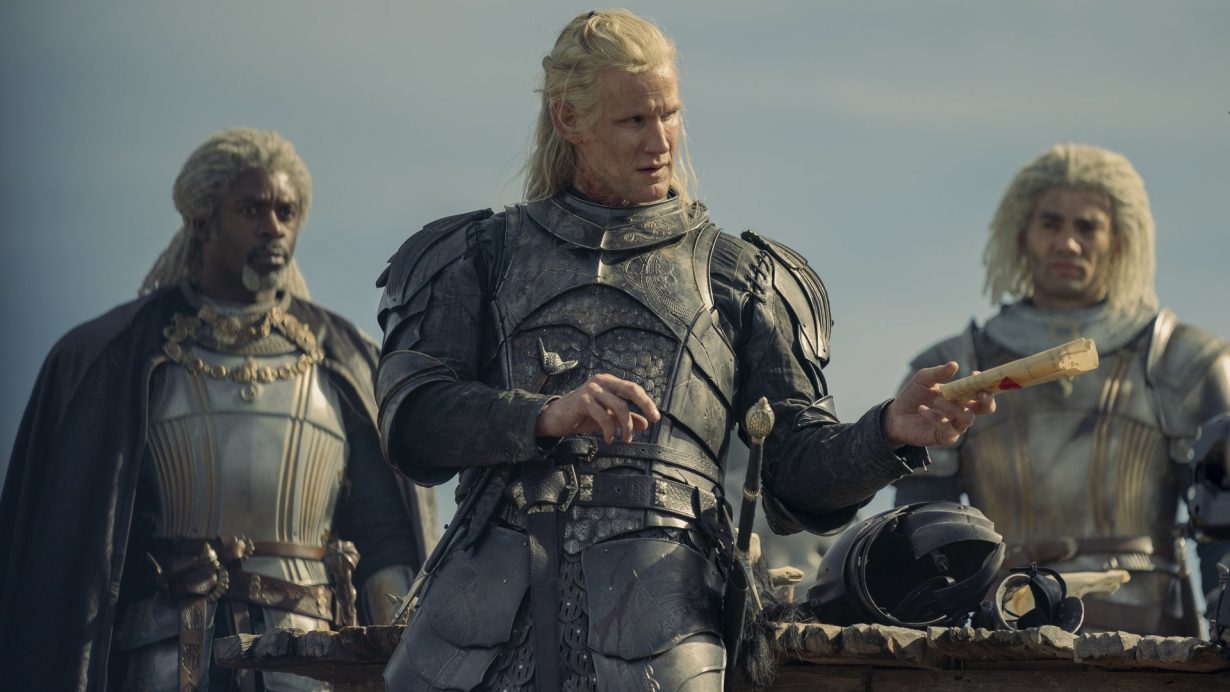
Both TV shows are in some obvious way about America, especially with respect to its policing and its wars: the opening scene of House of the Dragon has a dragon screaming through the clouds like an F-15, while a major subplot of The Rings of Power concerns an unhappy century-long military occupation by the elves of the realms of men that sided with the dark lord Morgoth (Sauron’s mentor) in the last war. Morfydd Clark plays an obsessed version of the future elf-queen Galadriel haunted by her suspicion that ‘Sauron is still out there,’ waiting for his chance to rise again, and has led her exhausted Elf Team Six through the wilds for decades in hunting Middle-earth’s version of Osama bin Laden. Both shows likewise wear their ambivalence about American military power, and their anxieties about a coming collapse of American hegemony, on their sleeve. In House of the Dragon, US air superiority (the dragons) has unjustly propped up a corrupt, incestuous aristocracy backstabbing and betraying each other with no regard for the ‘smallfolk’ – a ruling class that we know from Game of Thrones must inevitably fall. Meanwhile, the capital city of King’s Landing is a failing, crime-ridden cesspool, and its cops are as openly corrupt as the nobility, if not more so, in the thrall of a fascist degenerate with no redeeming qualities whatsoever (Daemon Targaryen, played with devilish glee by Matt Smith). In The Rings of Power, in contrast, it is the weakness of the feckless ruling class that prevents the few remaining capital-H Heroes from doing the necessary violence to preserve the peace, setting the stage for what we know from the chronologically later narratives will be Sauron’s return and rise to power.
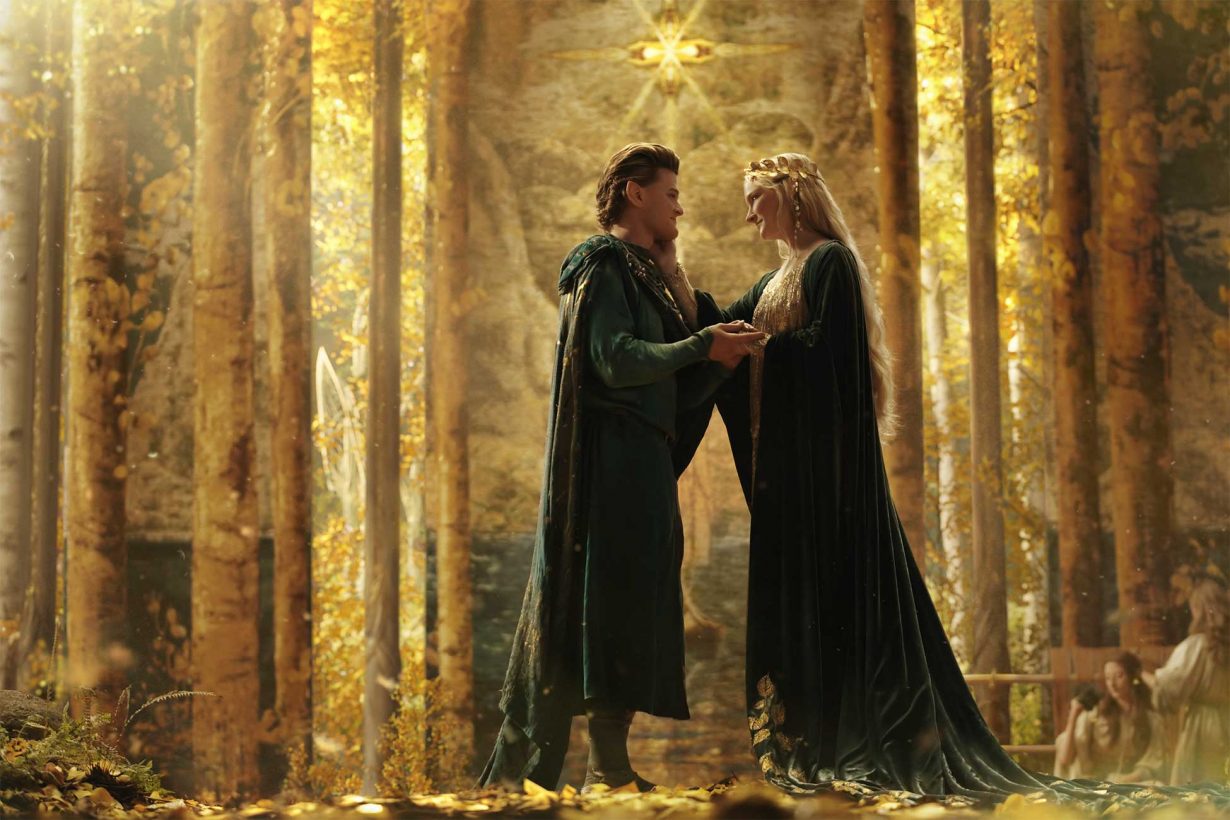
The fact that we know the futures of all these characters, and know how the events they are embarking on represent catastrophes that will permanently scar the futures of both Westeros and Middle-earth, haunts both shows, in multiple ways. It makes it hard, for instance, for anyone who has scanned the Wiki of Ice and Fire entry on Rhaenyra Targaryen to see her as any sort of feminist reconsideration of Daenerys, at least in the versions of the story that have been told, regardless of what HBO’s advertising department wants us to think; likewise, the beautiful locations we visit in this version of Middle-earth are waiting to be laid to waste rather than liberated, in an inevitable long darkness that will ultimately render the continent shattered and depopulated for thousands of years. There is, in short, an inescapable grimness to these stories that surpasses even the grimdark turn the fantasy genre has taken over the last 30 years (in large part due to the popularity of George R.R. Martin as a sort of ‘anti-Tolkien’). Rather than watching these fantasy narratives awaiting the spiritual nourishment of restoration and a happy ending, the sort Tolkien believed fairy-stories were supposed to have, we are watching these narratives with bated breath waiting for everyone to die (if they’re lucky) or survive in failure and shame (if they’re not). We watch these shows with the surety that everything starts out bad and will get even worse: if there is a toxic nostalgia for the unchecked supremacy of rich white men here, there is also an unflinching recognition of the actual behaviour of the Great Men of History, and a sort of gleeful anticipation that we will get to see it all turn to ash before the end.
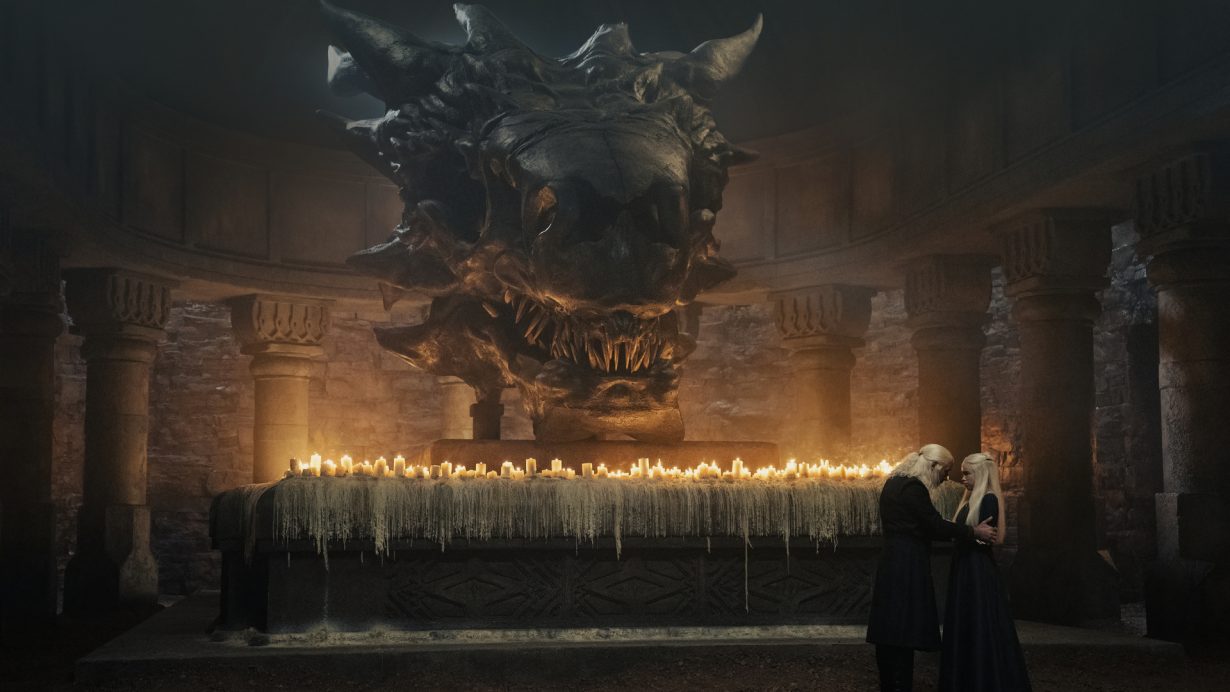
Watching the first three episodes of House of the Dragon, knowing from the later Game of Thrones novels what is to come, I was struck by my sense that this may be the single most morally depraved narrative ever aired on television; among its severed limbs and skulls bashed-in, the first episode features a forced, unmedicated caesarean birth so bloody and terrible I couldn’t even finish the scene, while the second episode explores which of two girls (one aged 12, the other 17) the apparently good-hearted king should marry (with the implication that the brutal civil war that is to come originates at least in part from him choosing the older of the two girls, instead of the younger) – and this is all before the horrifyingly deep dive into incest and sexual grooming any show about the Targaryens must inevitably take. (Don’t believe me? Check the Wiki.) The Rings of Power, in contrast, retains an element of Tolkien’s spiritual vision about it, with characters competing across both of its premiere episodes to have the most quotable life-lesson about striving, resilience, and faith – but even here we find the narrative preoccupied by the idea that in a world besieged by orcs the longing for peace is a dangerous moral weakness that, in the end, must be overcome, lest evil triumph. Of course, Frodo and Sam had to learn that same lesson, for a time – but they got to see another type of story begin too, and most of these characters simply won’t.
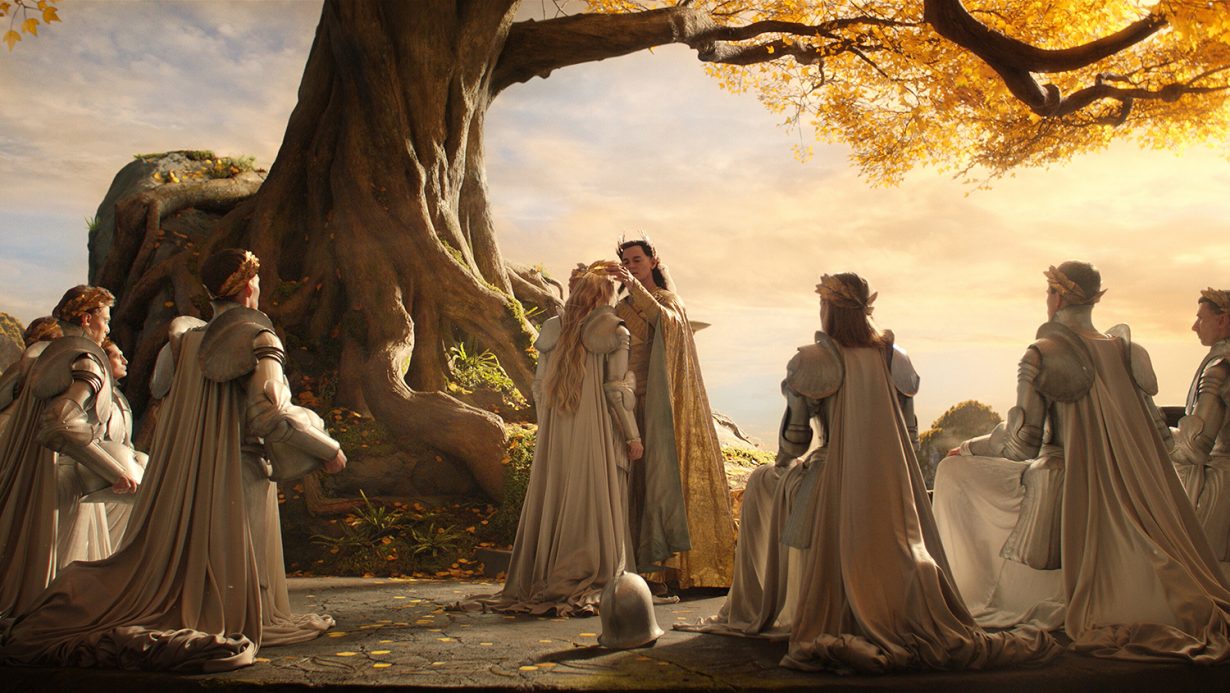
The Rings of Power preposterously claims to be based on the ‘appendices’ of The Lord of the Rings, because its producers could not acquire the rights to The Silmarillion (1977) from the Tolkien estate; while early promotion of the show claimed Peter Jackson was a consulting producer, this too turned out not to be accurate, and the show is in fact both canonically and legally distinct from the Jackson films despite plainly trying desperately to replicate their look and mood in practice. In this sense we actually don’t know all that much about where The Rings of Powers will take its characters; we can safely assume that a battle-hardened Elrond (an impish Robert Aramayo lacking any sense of the kingly grandeur of Hugo Weaving) will eventually wind up on top of Mount Doom begging Isildur to throw in the Ring, and that Galadriel will eventually become a fierce and powerful queen, but most of the other characters are original to this property and thus have unknown fates. It’s in this sense only that we might hope the show can find unknown corners of the map to tell new stories that don’t end quite so horribly (a prospect of diverging even further from ‘canon’ that admittedly makes this devoted Tolkien acolyte a bit nervous, but I’ll give it a chance). The meta-narrative of House of the Dragon, in contrast, has been more or less fully told in both Game of Thrones and its spinoff novel Fire & Blood (2018); to watch this show, knowing anything about the future of these characters, feels almost malevolent, pornographic. Here we can see that the notion of the fantasy genre as some maladaptive longing for the safety and innocence of childhood no longer holds, if it ever did; instead, to watch House of the Dragon is to revel in the absolute worst that humanity has to offer, precisely in the certainty that it will never get any better than this.
